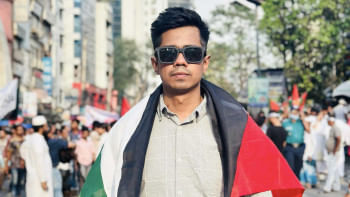The culture of change
LAST week, while I was engaged in a casual conversation with my friend Wendy over a latte, she informed me that her son Ben, a budding violinist, had been selected by his school to participate in a music concert in Vienna. Before I could congratulate her, Wendy began to complain that Ben had refused to play his violin in the Mall to help raise money for financing his trip. As is common in the US, parents are required to contribute to these school trips and Wendy asked Ben to help out by performing at the Mall. But, Ben, being an introverted teen-ager, rejected her proposal outright, which frustrated Wendy.
I must confess that I was a bit surprised at Wendy's expectation that a 14-year-old should pay for his concert tour. To me, this attitude appeared to be, in essence, very "American." As a South Asian mother, if my son were selected to participate in a prestigious musical event, I probably would have scraped the bottom of my savings to fund his excursion! I do appreciate that teaching children the value of money is part of a good upbringing. But, if my child "earned" a place in a music concert I would definitely help him develop his confidence through the exposure. For me that, too, is an important part of a child's upbringing.
However, Wendy's comment set me thinking on an issue that I have been grappling with for some time. She and I are both immigrants -- she is originally from China and I am Bangladeshi. What is puzzling is that, although both of us have lived in the United Sates for the same period of time, my friend seems to have adopted the attitudes and values of this country at a faster pace. I am still caught up in the time warp of Bangladeshi traditions. I wonder why?
I must clarify that this column is not about whether the cultural values of the American society are good or bad. It's a candid discussion on why some races blend more easily with the behavioural norms of their adopted country. For instance, Wendy had no qualms about changing her Chinese name to one that is less taxing on the western tongue. I often find my South Asian friends complaining about their colleagues at work struggling with "Ejazuddin" or "Subramanyam." But the idea of becoming Eddie or Sam seems to militate against their basic identity!
In general, most first generation immigrants have difficulty adapting to their changed environment. However, I have observed that South Asians are more resistant to change than other ethnic races. Surprisingly, they seem to do fine in their professional setting, where they quickly adopt the work ethic. But when it comes to personal and social norms they are relatively slow in embracing new diets, dress codes and customs, and seldom miss an opportunity to seek out a dosa or kabab place wherever it may be!
So, why are immigrants from the Indian sub-continent relatively more protective about their traditional practices and food habits? Is it because we are proud of our ancient civilisation and our identity is inextricably tied to our cultural heritage? It's true that we are more anchored to our cultural traditions than many other races and are, therefore, reluctant to cut the umbilical cord. But where do we draw the line as immigrants? How much do we retain and to what extent do we "acculturate"? More importantly, is it fair to thrust our way of life on those around us with an "in-your-face" attitude? For example, is it necessary to go to a restaurant and make a public spectacle about halal meat or the non-vegetarian content of the food? If we have taken the plunge to migrate to a new country we need to be sensitive to the ways of the majority. Even if we don't accept them we can be discreet about our discontent.
Many believe that the United States today is a mosaic, where multiple cultures are juxtaposed with the modern American culture, thus allowing each ethnic group to retain its unique qualities. However, no matter how much we immigrants try to preserve our identity, at some level there may be a need to integrate for the sake of greater social harmony. Also, if we isolate ourselves we run the risk of missing out on the rich eclectic influences of a country where so many diverse mores and traditions have converged.
As a first generation migrant to the United States, I believe that retaining our inherited culture and imbibing the practices of our adopted country are not mutually exclusive. In fact, there are some basic areas where the core values of all races are the same. Perhaps we can make a more consolidated effort to accept these points of convergence.
The writer is a renowned Rabindra Sangeet exponent and a former employee of the World Bank. E-mail: shifting [email protected]

 For all latest news, follow The Daily Star's Google News channel.
For all latest news, follow The Daily Star's Google News channel. 



Comments